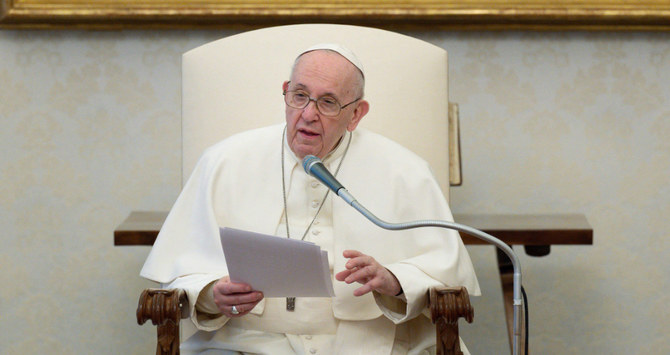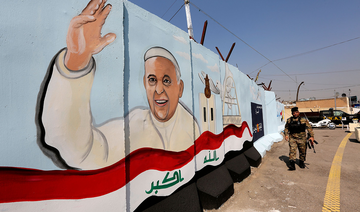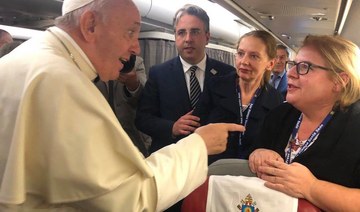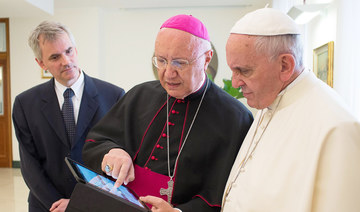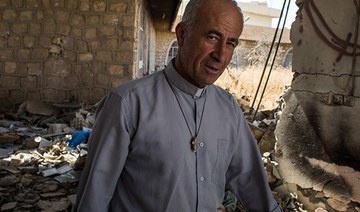LONDON/ROME: No one knows how many Iraqi Christians will flock to witness the historic visit of Pope Francis to Iraq, for the simple reason that no one knows exactly how many of the faithful remain in a country that can trace its Christian roots back to the earliest days of the faith.
Plagued by years of internal strife following the US-led invasion in 2003, Iraq has not conducted a census of its population since 1997.
One planned for 2020, the year the coronavirus pandemic struck the world, was not carried out. But while estimates of the number of Christians in Iraq have varied over the years, they have all agreed on one thing — that in modern times, the population of one of the oldest Christian communities in the world has steadily dwindled in the face of increasing insecurity and persecution.

Charlemagne (742-814), crowned Emperor by pope Leon III, December 25, 800. (Photo by Photo12/UIG/Getty Images)
Mesopotamia, the fertile plain between the rivers Tigris and Euphrates in what is today Iraq, is where modern civilization first put down roots.
This is the land where more than 6,000 years ago writing, agriculture and the world’s first great cities flourished. But the land of Iraq is also steeped in the heritage of Christianity — more sites mentioned in the Bible are located in Iraq than anywhere else other than the Holy Land.
In the tradition of the three great Abrahamic religions — Christianity, Islam and Judaism — the patriarch Abraham hailed from Ur, the ancient city of the Sumer, one of the world’s oldest known civilizations. Today some remains of the world’s first great city can still be seen, near the modern-day city of Nasiriyah on the banks of the Euphrates.
Iraq is even associated with the creation narrative of the Christian faith as the scene of the fall from innocence of Adam and Eve, the first man and woman. Many Christian scholars believe that the Garden of Eden described in the Book of Genesis was located in southern Iraq, where the two great rivers of Mesopotamia empty into the Gulf.

Other biblical characters, saints and prophets are associated with sites throughout Mesopotamia. Rebecca, the wife of Isaac, is believed to have come from ancient Carrhae in upper Mesopotamia, now the Turkish city of Harran on the border with Iraq.
The tomb of the Hebrew Prophet Ezekiel is held to be in the town of Al-Kifl, between Najaf and Hillah on the east bank of the Euphrates. But it was the destruction by Daesh of the tombs of Al-Nabi Danyal (the biblical Prophet Daniel) and Yunus (Jonah) in Mosul in 2014 that underlined both the history and the fragility of the Christian community in modern Iraq.
According to the Annuario Statistico, the Vatican’s annual publication tracking the number of Christians in the world, the faithful in Iraq numbered about 1.5 million in 2003, on the eve of the US-led invasion. Life for Christians and other minorities under the dictator Saddam Hussein and his essentially secular Baathist regime, hostile to Islamist extremism, was relatively stable.
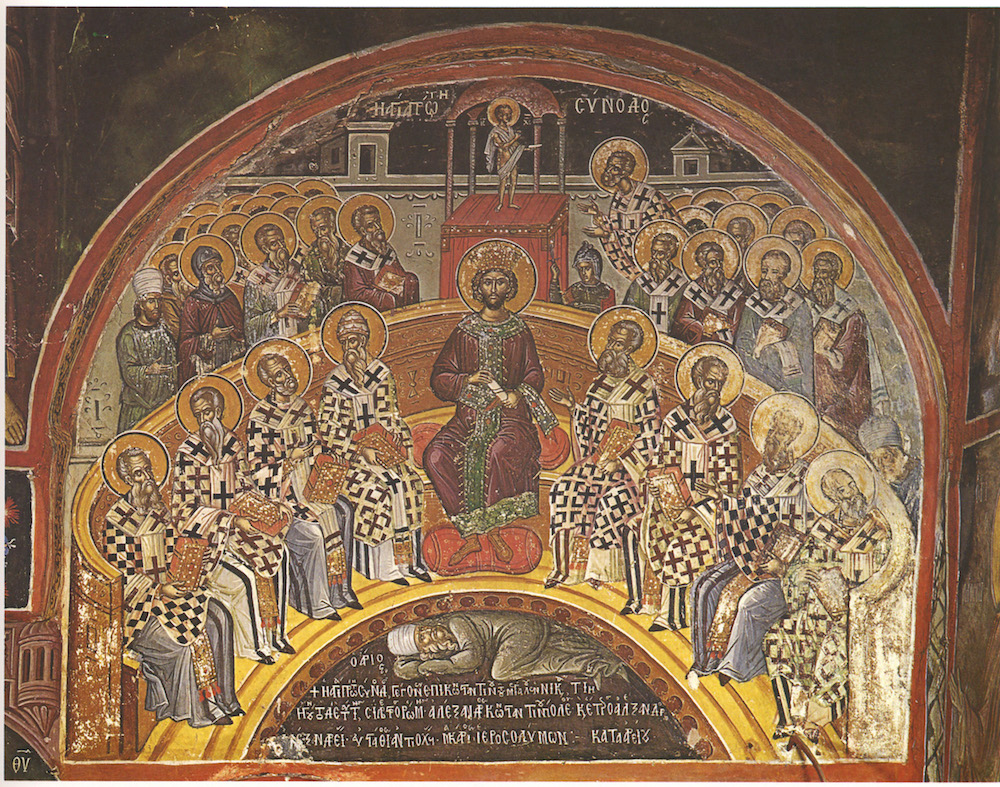
First Council of Nicaea, First Half of 16th century. Found in the collection of Stavronikita monastery, Mount Athos. (Photo by Fine Art Images/Heritage Images/Getty Images)
Indeed, one of Saddam’s closest allies, Tariq Aziz, who became his deputy prime minister and foreign minister, was a Christian. Aziz was born Mikhail Yuhanna, the son of a Chaldean Christian family in the town of Tel Keppe, northeast of Mosul.
Not that there was not discrimination. Under Saddam, Christian schools were nationalized, and a law passed dictating that the religion’s history could be taught in state schools only if at least a quarter of the pupils were Christian. The presence of a single Muslim pupil, on the other hand, was sufficient to oblige all to study the Qur’an.
Christian communities have also found themselves caught in the crossfire of Iraqi politics. Between 1978 and 1980, Kurdish rebels hit numerous Christian villages, seeing them as aligned with Saddam’s regime. But things took a significant turn for the worse after the 2003 invasion.
The overthrow of Saddam, accompanied by the enforced disbanding of the Baath Party and the Iraqi military, unleashed years of chaos, insurgency and sectarian terror on the country — with Christians often in the line of fire.
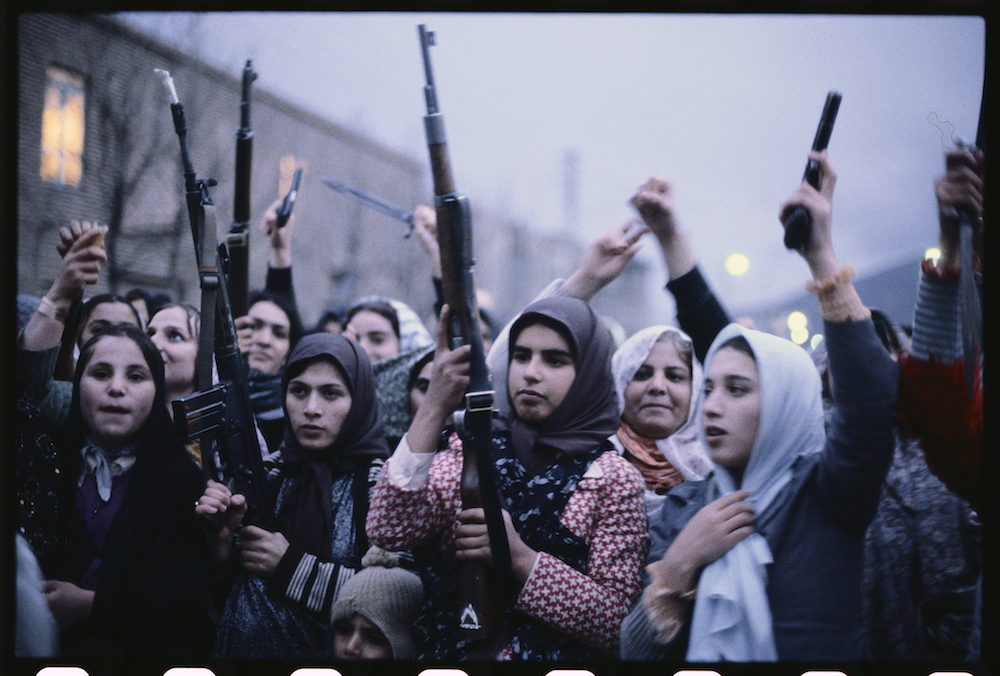
Kurdish rebels mounted a large campaign during the early 1980s against Iran, Iraq, and Turkey in an attempt to regain sovereignty over their homeland. (Photo by michel Setboun/Corbis via Getty Images)
Between 2003 and 2008, the Christian population of Iraq halved as more than 65 churches were attacked, with those who fled seeking sanctuary in countries including Jordan and Syria, or in Europe or North America.
The record of the attacks on Christians in this period, recorded in the Annuario Statistico, is a litany of horror and suffering. On Aug. 1, 2004, 18 people died and 60 were injured in car bomb attacks on five churches — four in Baghdad and one in Mosul.
On Jan. 29, 2006, a series of blasts near Christian churches in Kirkuk and Baghdad killed three. On Oct. 9, 2006, Syrian Orthodox Priest Paulos Iskandar was kidnapped in Mosul and found beheaded two days later.
On Nov. 26, 2006, Monther Saqa, pastor of an evangelical Christian church in Mosul, was kidnapped and murdered. On June 3, 2007, Ragheed Aziz Ghanni’s car was stopped by armed men who murdered the priest and his three companions, all sub-deacons.
On Feb. 29, 2008, Paulos Faraj Rahho, the Chaldean archbishop of Mosul, was kidnapped. His three companions were murdered on the spot, and the archbishop’s body was found two weeks later. On April 5, 2008, Syrian Orthodox Priest Youssef Adel was shot dead in Baghdad.

A Christian militiaman stands near the broken body of a statue of Christ in the 13th century St. Jacob's Church on November 4, 2015 near the frontline with Daesh fighters in Telskuf, northern Iraq. (Photo by John Moore/Getty Images)
In all, according to Cardinal Louis Sako, the archbishop of Kirkuk, since 2003 there have been 710 Christian martyrs in Iraq.
In one of the worst incidents, 58 men, women and children died when militants of the Al-Qaeda-affiliated Islamic State of Iraq attacked the Syrian Catholic Cathedral of Our Lady of Salvation in Baghdad during Sunday Mass on Oct. 31, 2010.
“What happened was more than a catastrophic and tragic event,” said Iraqi Human Rights Minister Wijdan Michael, himself a Christian, at the time.
“In my opinion, it is an attempt to force Iraqi Christians to leave Iraq and to empty Iraq of Christians.”
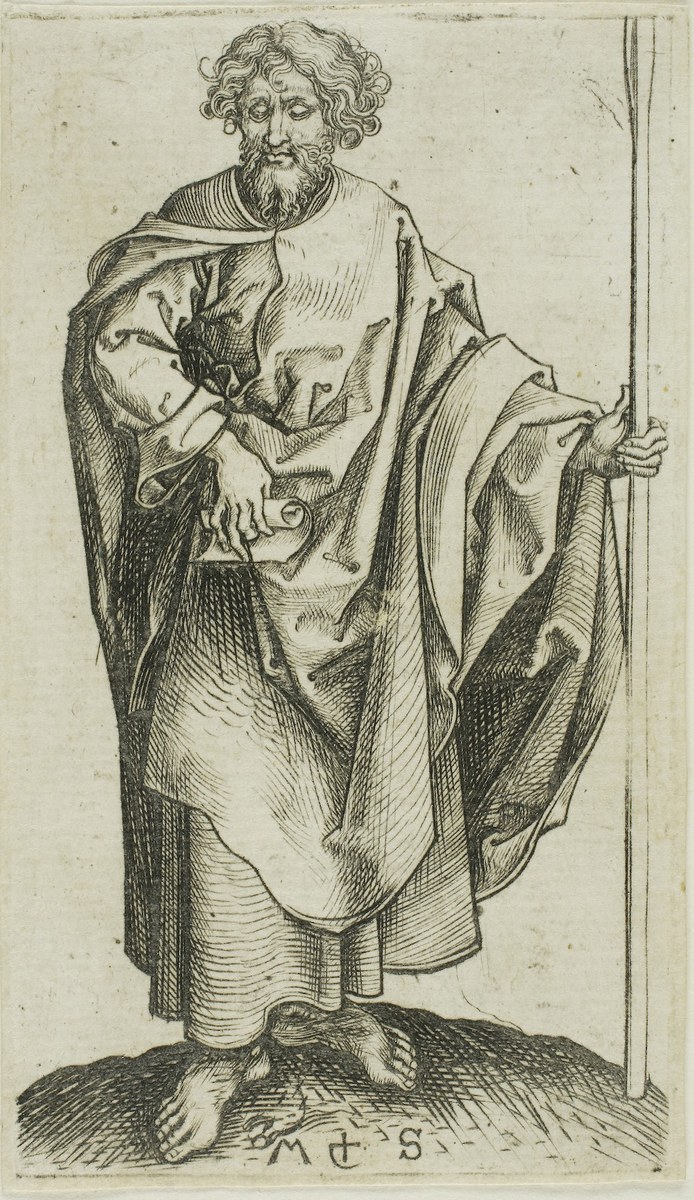
St. Thomas, from Apostles, n.d., Martin Schongauer, German, c. 1450-1491, Germany, Engraving on paper, 90 × 50 mm (plate), 91 × 53 mm (sheet). (Photo by: Sepia Times/Universal Images Group via Getty Images)
The church had been attacked before. In August 2004, it was one of five churches hit in Baghdad and Mosul, in which 12 people died. Commemorating the anniversary of the 2010 massacre in 2018, the Assyrian Policy Institute said there had “yet to be any meaningful change in how Iraq’s indigenous Christian Assyrian population is viewed and treated.”
In the years since the massacre, it added, “Assyrians in Iraq have faced threats to their existence in the emergence of ISIS (Daesh) in 2014 and the scuppering of any hope to fair representation in both the Iraqi and Kurdistan Region Parliaments.” Pope Francis will remember all of Iraq’s Christian martyrs when he visits Our Lady of Salvation in Baghdad.
The emergence of Daesh brought fresh horror for Iraq’s Christians. In June 2014, Daesh seized Mosul and thousands of Christians fled for their lives, first to nearby Qaraqosh and, when that seemed certain to fall, to Erbil, capital of Iraqi Kurdistan.
The monastery of St. Elijah, founded by the Church of the East near Mosul in the late sixth century, closed in 1743 after the monks were killed by soldiers of the shah of Iran for refusing to convert to Islam. The building, although damaged by US troops during the 2003 invasion, remained a destination for Christian pilgrims until it was reduced to a pile of rubble by Daesh in 2014.
A report in the New York Times the following year spelt out the choice faced by the Christians in Mosul and Qaraqosh: “They could either convert or pay the jizya, the head tax levied against all ‘People of the Book’ — Christians, Zoroastrians and Jews. If they refused, they would be killed, raped or enslaved, their wealth taken as spoils of war.”

Iraq's Deputy Prime Minister and Foreign Minister Tarek Aziz speaks to a gathering of the United Nations Security Concil 14 June 1988. Aziz is attending the third special session on disarmament. (AFP/File Photo)
Unsurprisingly, research by the EU into the fate of minorities in Iraq at the height of Daesh’s terror concluded that by 2015 just 500,000 Christians remained in the country, living mainly in Baghdad, Mosul, the Nineveh Plains and the autonomous Kurdistan region.
Today, there could be as few as 150,000. One of the most poignant moments of the pope’s visit will be when he visits the Qaraqosh community at the Church of the Immaculate Conception, Iraq’s largest church, which was badly damaged during the occupation of the city by Daesh.
Tradition holds that Iraq’s association with Christianity dates back to the first century AD, when following the crucifixion of Jesus Christ, his disciple Thomas traveled east to preach in Mesopotamia.
The Syriac Orthodox Church of St. Thomas in Mosul is said to have been built on the site of the house in which Thomas lived, and in 1964 workmen discovered what were believed to be his finger bones. After the fall of Mosul to Daesh in 2014, these relics were transferred for safekeeping to the Syriac Orthodox Monastery of St. Matthew near Bartella, on the Nineveh Plains, founded in the fourth century.
Thomas — later canonized as St. Thomas the Apostle — had two disciples, Thaddeus of Edessa, also known as Mar Addai, and Mar Mari (mar is a Syriac title of respect, meaning lord.) To these two is credited the foundation of the Christian Church in Mesopotamia.
This was what became known as the Church of the East, also known as the Persian Church and — because of its support in the fifth century of the theologically controversial Nestorius, the archbishop of Constantinople — as the Nestorian Church.
The story of Christianity in Mesopotamia is one of frequent schism. In 410, at the Council of Seleucia-Ctesiphon, all the Christians of the Persian Sassanid Empire gathered together in the capital city, near modern-day Baghdad, to form a single church — the Church of the East, which in 424 broke with the Roman Empire.
Even after the rise of Islam and the Muslim conquest of the Sassanid Empire, the Christians — tolerated as a dhimmi, or protected non-Muslim community — thrived.
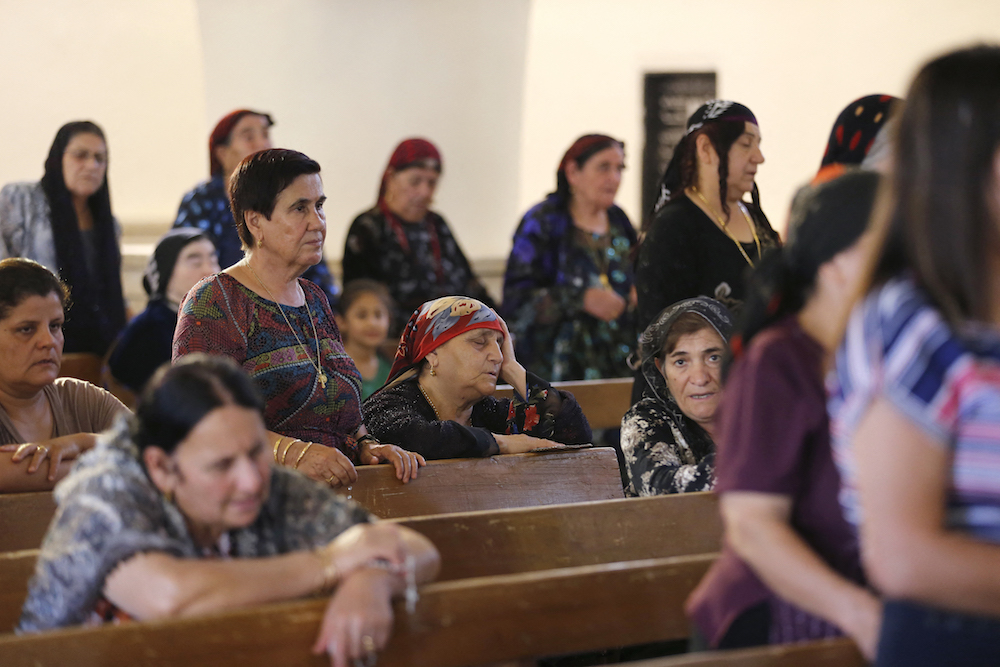
Iraqi Christians fleeing the violence in the towns of Qaraqush and Bartala, both east of the city of Mosul in the northern province of Nineveh, pray at the Saint George church on July 1, 2014 in the Kurdish autonomous region's capital Arbil. (AFP/File Photo)
Between the eighth and 13th centuries, the Church of the East expanded dramatically, spreading the gospel from its base in Mesopotamia and establishing more than 100 dioceses, from the Mediterranean coast through Iraq and Iran and India, and as far afield as the Mongol Empire and China.
Decline began in the 13th century as the Mongols turned their backs on Christianity and embraced Islam, and in the 14th century Tamerlane, ruler of the Turco-Mongol Timurid Empire, set about purging his territories of all non-Muslims.
From then on, the Church of the East was confined to the land where it had all began — northern Mesopotamia, where, despite all the trials and challenges of modern-day Iraq, its descendant Christian churches and their dwindling band of parishioners continue to stand by their faith.
Over the centuries internal schisms have followed, rifts reflected in the diverse denominations to which Iraqi Christians belong today, including the Assyrians (or Nestorians, members of the Syriac Orthodox Church) and the Armenian, Chaldean and Syriac eastern Catholic churches.
But whatever their doctrinal differences, all Iraq’s Christians will see the historic arrival of the pontiff in their midst as a sign that their courage and persistence in the face of shocking adversity has not been in vain.
“We are trying to heal this wound created by ISIS,” Father Karam Shamasha, one of two priests at St. George Chaldean Catholic Church in Telskuf — a Christian village about 20 miles north of Mosul — told the Catholic News Agency in November 2020.
“Our families are strong; they have defended the faith. But they need someone who says, ‘You have done very well, but you must continue your mission’.”
That someone will be Pope Francis. Chaldean Catholic Archbishop Bashar Warda of Erbil told Aid to the Church in Need, a charity that works on behalf of persecuted Catholics in Syria and Iraq, in December: “We are a people that have been marginalized to the very edge of existence. To have His Holiness come to visit us now may very well be the thing that saves us.”




